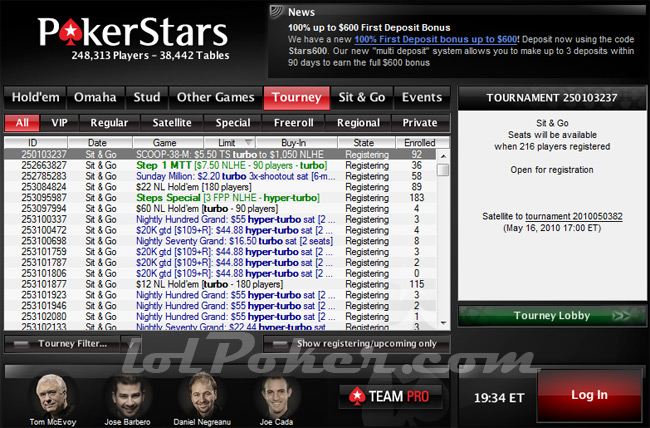Badugi Ring and Cash Game Strategy
Badugi has two common types of poker tables to play at. One is badugi tournaments and the other is the badugi ring games. Each of these games have much different strategies involved. In fact, a ring game, or also known as cash game, has a type of strategy that will not work in tournaments and vice versa. If you do not know what a ring game is, it is basically just a casual table game that you can join and leave at any time. Typically, they are listed in online poker rooms as $1/$2 or of other various stakes. $1 is the amount a player pays in the small blind and $2 is the big blind. Players will also come across cash games that allow fixed limit rules, pot limit and half-pot limits. The reason they are known as cash games is because people can bring in cash, money or as many chips as they want, but there is typically a minimum amount required before being allowed to the table.
You will typically find these ring games at PokerStars shown at the bottom of the page so visit them if you want to practice these strategies for free that I am about to go through. One of the important concepts used in badugi is related dealer button and table position relative to this button or marker. After each hand of badugi, the button shifts to the next player on the table in a clockwise direction. The person to the left of the button pays the small blinds, the person 2nd to the left pays the big blinds. The person who is in the button position is the dealer (computers deal automatically online). Whoever is in this dealer position has the greatest advantage in the game.
If you are in the dealer position, this means you are the last to act. The strategy behind this involves having all of the knowledge of your competition, their actions and anything else at the table before making your own betting decisions. If you have a weak or mediocre hand and everyone is raising, then it might be wise to fold. Or if you have a powerful hand, you can see who is committing money to the pot and you can raise them to maximize the size of the pot. Those in the late position have the best advantages, so remember this in your strategy. Likewise, the ones who are first to act will be in the worst position and will have no other knowledge on the table to work off of.
The next strategy will involve determining the odds of your opponent winning if you have a 4 card badugi. Recall, if you have a "badugi", this means that all 4 of your cards are of different suits. So let's assume you are dealt a very nice 4-card hand with a 7 high. You can determine the odds of another player beating this if they are assumed to have a 3 card hand and they are only drawing one card. So they are trying to draw that last suit in order for them to make a 4 card hand. So you can use some strategy to determine how many "outs" there are or cards that might possibly help them.
Continuing on, normally there would be 10 outs but since you already know that you hold a 7 high, then assume that the 3 cards your competitor has is less than 7 or pretend that they hold the most powerful three cards (A-2-3). So in order for them to win, they must not only draw the proper suit, but also a card in that suit that is lower than 7. They must also not draw cards that will pair any of the cards in the A-2-3 either. So there are only 3 possible cards or "outs" that can help them beat you, which are the cards: 4, 5 or 6. This is a nice little strategy to keep track of in ring games and it can be used any time.
There is a strategy that you should take advantage of even before you join a cash game table. Take a look at how many people are playing at the table. Fewer people on a given table means better odds for yourself. If there are 8 people on a table, this means that there is more risk that someone else is going to have something good and there will almost always be someone who gets a 4 card hand. If you play on a 4 person table or 6 person, that means you can be a little looser and not rely on getting a powerful hand before betting. So play in a ring game room with fewer people. If you are on a populated table, then the objective is to get as many people out as early as you can since this will reduce the "chasers" and will increase your chances of winning due to the lower variance of players and card hands.
Another tip that you should apply in your strategy is to look for tight badugi players. If you are playing on a tight table with conservative players, you can bluff more easily to steal the blinds and pots. Again, be cautious if you are playing on a 8 player table when everyone is tight because it will be more likely for tight players to not call the bluff when they do get a great hand to start off with. Take notes on people as well. PokerStars has an option where you can type in some notes and "tack" them onto a player, so if you ever see them again on some other day, you can click and recall the notes for that player. Take note on whether they are tight and aggressive, tight and passive, loose and aggressive or loose and passive.
One more thing to use in your ring game strategy is how to read your opponent and it has to do with the suggestions to write notes. Tight players tend to fold on every hand except when they get something good, which is a good tell or read to figure out what they might have. Aggressive players will suddenly bet heavily once they get something good. Loose competitors, in contrast, usually bet in every single round, but not necessarily aggressively. The passive player tends to slow-play their hand and these are the most dangerous ones, especially the loose variety. If you want to make a lot of money in these ring and cash tables, it will generally take a long time and you will get used to certain players. Take notes on them to find the ones you can "milk" more easily than others to make bigger profits and more cash.


 US Players and Credit Card, BitCoin Deposits Accepted!
US Players and Credit Card, BitCoin Deposits Accepted!


